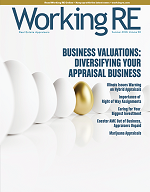 |
“One of the best courses that I have had in 17 years!” -Amy H.
|
Caring for Your Biggest Investment
By Dustin Harris, The Appraiser Coach
According to some current statistics the average age of real estate appraisers in the United States is approximately 60 years old. While that is not old from a purely chronological standpoint, it is old from a professional standpoint. Here are some things to think about no matter what age you are.
This statistic indicates that there are many appraisers out there who have been in the appraisal saddle for 30 to 40 years. This may further suggest that many are about to retire or at least slow down a little bit. Therefore, to both the well-seasoned appraiser and those who are just getting their seasoning now, a number of questions are in order to help prepare.
How Is Your Company Set Up?
Your appraisal business may be one of the biggest investments you have. Therefore, whether you have been an appraiser for five years or 40 years, your business needs to be set up so that it is easy to transfer into other hands if and when the time comes. There are sole proprietorships, S-corporations, C-corporations, partnerships, limited liability corporations, limited liability partnerships and so many more. If you were to sell your business, or worse, become incapacitated and not be able to take a hands-on approach to management anymore, you want your business, or your share in it, to be easy to transfer should that become necessary. This is where tax and accounting planning are imperative.
What Is Your State of Health?
While 60ish is not old anymore, it is an age at which it is not uncommon to spend a little more time in the doctor’s office. This may be especially true for valuation professionals. One of the reasons for this is the stressful nature of the appraisal business. If the appraiser does not ameliorate the stress properly, it can exact a terrible toll, not only on the appraiser but on the appraiser’s family. Therefore, it is reasonable to evaluate whether or not you have taken care of yourself physically and mentally over your business career and what the next step is in taking care of your health. This is where medical (and maybe even mental health) advice is a must.
Do You Have a Succession Plan for Your Business?
It is important to have a long-term succession plan for your business. Who is going to take over your business? Will you sell it to your kids? Your partners? Your associates? Your competitors? Some big anonymous corporation? Will you sell the business but keep working there? Will you finance part of it to generate an income in retirement? Do you want to cash out of the purchase and sale, so you can invest its proceeds when and where you choose? After the sale, are you going to keep a hand in the business and/or its management? For how long? Some say you cannot sell an appraisal business. I disagree and have helped several clients do exactly that. You need to set your company up in such a way that it has some value to a person other than yourself. Most appraisers are not currently set up in a way that their business is of value if they are not personally in the picture. Changing that takes time. Again, this is a situation in which tax and accounting counsel are of the utmost importance.
(story continues below)

(story continues)
How’s Your Insurance?
You have probably had some type of life insurance since you began working, but this is likely term insurance. There is nothing wrong with term insurance, since it serves a specific purpose. However, it is also important to consider whole life insurance. Some people do not like it since they say they can get better returns on their money by handling their investments themselves. That may be true. But if you are a busy appraiser, you may not have time for that. Additionally, not only does whole life provide life insurance benefits if you need it, it also provides an annuity income later in life when an income, or a supplement to it, may be more important than the death benefits. There are many financial tools to consider and it is best to turn to a financial planner here too.
Disability insurance is another serious consideration for self-employed appraisers. It is expensive, but if you are laid-low for some reason, it may be difficult to keep your business’s doors open. Hip and knee replacements (and the months of recovery) can shut you down for two to 12 weeks, and they are common procedures for the well-seasoned appraisers among us. Yes, you can possibly do reviews or desktop appraisals from your hospital bed, but what about all of the other management stuff that only you can do? Who will handle those responsibilities? Now is the time to get professional investing and insurance counsel, not when you are in a hospital bed hooked up to tubes and machines (or worse).
Have You Made Yourself Dispensable?
Yes, are you dispensable? In other words, have you trained your staff to be able to operate professionally and seamlessly in your absence? Appraisers tend to be hands-on folks and there is nothing wrong with that. However, if you have to make every decision, review every report before it goes to the client, sign every check, handle every complaint that comes in from clients and consumers— if you are the only one who knows how to fix the server or load the ink cartridge, then you have made yourself indispensable. If you are unable to leave your business in the hands of your staff for a time, then you cannot go on vacation, take CE or take the time to get your knee replaced. If you are indispensable, then the business cannot run without you which means your business—your cash machine—dries up if you are not there, nose to the grindstone, every day. If you are currently indispensable, you may want to hire a business consultant to help you make the necessary changes so that you can become dispensable.
(story continues below)

(story continues)
Do You Delegate?
Why are you still typing reports? Obviously, someone has to do it but that someone does not have to be you. You can bill your time out as an appraiser at $50 or more per hour then hire somebody at $12 an hour to type reports. That should be obvious, yet too many appraisers do not understand (or have not yet been converted to) the Law of Delegation. Face it, if you can bill $75,000 per year doing everything yourself, you can likely bill even more if you paid someone to do the Tier I and Tier II work, so you could spend more time in appraising and probably be more profitable.
Why do you have to do a detailed review of every report that goes out the door? Could you hire a semi retired, experienced appraiser or an independent contractor, on a per-appraisal basis to do the reviews for you? You will still give them a quick once-over before you submit them but if you hire an experienced appraiser who knows what you and the client want (and who understands your market), then you could free up a significant amount of time to do more appraisal work.
Your doctor does not weigh you and take your blood pressure; a nurse or Physician Assistant (PA) does that. The doctor is paid a lot of money to specifically diagnose and treat health problems. PAs do the lesser work so that the doctor can do more of the work that requires specialized expertise and training— and thereby generate more money to pay the nurse and PA. We may not be as educated as physicians, but are we any less professional? Perhaps we can apply the same principles of delegation to the appraisal world.
And the Point of All of This, Dustin, Is What?
The point of all of this is to start planning for retirement at age twenty-five, not age 65. We appraisers generally do not have a big company behind us to set up and fund a pension. We must do that ourselves. Therefore, get with a financial planner now and set up an IRA or a Keogh plan so that you will have the money you need to retire. Begin now to invest in whatever you want to, for a retirement income and/or a legacy to your children and grandchildren.
Get with an attorney now to set your business up properly so that, when the time is right, you can sell it easily and quickly for as much money as is possible. Get with an attorney now to set up your estate so that after you are gone, your heirs get as much as possible. Make an appointment with your doctor for a full physical. If the doctor recommends lifestyle changes, then make them. Depending on how old you are and your state of health, it might even make sense to pre-pay for your funeral arrangements.
Learn how to delegate, so you are dispensable and your company—your cash machine, can go on chugging out cash. Get the insurance plan(s) you need now, get the succession plans you need now, get the legal and accounting counsel you need now, so that whenever the time comes that you want or need to move on, you can, with as little worry as possible.
Disclaimer: I am not an attorney, CFP®, or CPA®, physician, etc., thus I do not offer legal, financial, accounting, or medical advice. You should not interpret anything in this article to be legal, financial, medical, or tax/accounting advice since there is no such advice here. If you want or need such advice, please contact the proper professional(s).
About the Author
Dustin Harris is a successful, self-employed, residential real estate appraiser. He owns and operates The Appraiser Coach where he advises and mentors other appraisers helping them to also run successful appraisal companies and increase their net worth. His free podcast can be listened to on iTunes and Stitcher.
CE Online – 7 Hours (AQB Approved)
Identifying and Correcting Persistent Appraisal Failures
Richard Hagar, SRA, is an educator, author and owner of a busy appraisal office in the state of Washington. Hagar now offers his legendary adjustments course for CE credit in over
40 states through OREPEducation.org. The new 7-hour online CE course Identifying and Correcting Persistent Appraisal Failures shows appraisers how to avoid CU’s red flags, minimize callbacks, save time, and earn more! Learn how to improve the quality of your reports and build defensible reports! OREP insureds save on this approved coursework. Sign up today at
www.OREPEducation.org.
Sign Up Now! $119 (7 Hrs)
OREP
Insured’s Price: $99
>Opt-In to Working RE Newsletters
>Shop Appraiser Insurance
>Shop Real Estate Agent
Insurance
Send your story submission/idea to the Editor:
isaac@orep.org



by Dave Seitz
Fantastic article! We know from first hand experience the urgency and importance of each step in taking care of your your biggest investment. We were like most that do not look that far forward and do not anticipate what can and does happen! Great information Dustin. We all need the reminder!
-